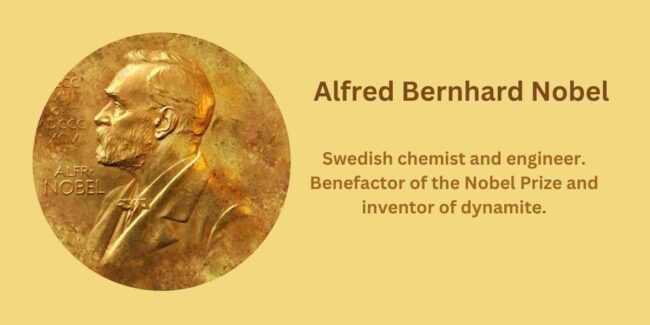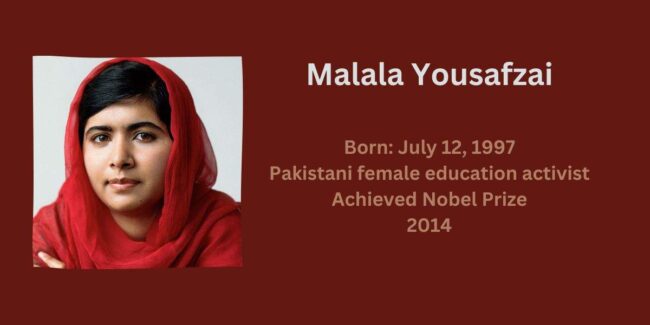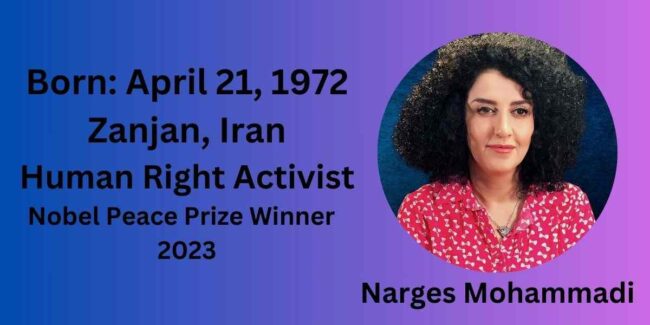The Nobel Peace Prize is one of the most prestigious and revered awards in the world. It honours individuals and organizations that have made signifi
The Nobel Peace Prize is one of the most prestigious and revered awards in the world. It honours individuals and organizations that have made significant contributions to the pursuit of peace, diplomacy, and social justice on a global scale. In this article, we will delve into the remarkable achievements of various Nobel Peace Prize winners throughout history, highlighting their remarkable efforts that have left an indelible impact on humanity.
5 Famous Nobel Peace Laureate
- 1. Mother Teresa: A Beacon of Compassion
One of the most iconic Nobel Peace Prize laureates is Mother Teresa, an epitome of compassion, selflessness, and dedication to the alleviation of human suffering. Born in Macedonia August 26 in 1910, she dedicated her life to serving the impoverist in Calcutta, India. Mother Teresa established the Missionaries of Charity, an organization that provided aid, comfort, and support to individuals suffering from poverty, illness, and social exclusion.
Her relentless efforts to improve the lives of the destitute earned her widespread recognition and admiration. In 1979, she awarded the Nobel Peace Prize for her unwavering commitment to humanitarian work, embodying the principles of love, kindness, and empathy.
- 2. Malala Yousafzai: The Voice of Education
In thinking about the power of education and the resilience of the human spirit, Malala Yousafzai immediately comes to mind. Born in Pakistan in 1997, Malala faced immense adversity as she advocated for girls’ education in her country, where the Taliban had banned girls from attending school.
Facing vast threats and a brutal assassination attempt, Malala’s unwavering determination to fight for the rights of girls to receive an education propelled her to international fame. In 2014, at the age of 17, she became the youngest recipient of the Nobel Peace Prize, recognizing her courage, activism, and commitment to empowering girls and women through education.
Most Popular Nobel Peace Laureate
- 3. Nelson Mandela: A Symbol of Unity
Nelson Mandela, the revered South African leader, epitomized resilience and the power of forgiveness. Mandela emerged as a unifying figure advocating for reconciliation and equal rights. His unwavering dedication to dismantling the racist system and promoting peace earned him global admiration.
Nelson Mandela, alongside Frederik Willem de Klerk, achieved the Nobel Peace Prize in 1993. This recognition solidified his role as a symbol of hope, transformation, and the power of forgiveness in the face of adversity.
- 4. Martin Luther King Jr.: Dreamer of Equality
Martin Luther King Jr., an American civil rights leader, forever changed the course of history through his tireless efforts in the pursuit of equality and justice for African Americans. His “I Have a Dream” speech stated the historic March on Washington in 1963 resonated with millions and became a rallying cry for social change.
King’s nonviolent approach to civil rights activism, coupled with his powerful oratory skills, inspired people around the world to strive for a society free from racial discrimination. He got the Nobel Peace Prize for his resolute commitment to achieving racial equality and justice in 1964.
- 5. Aung San Suu Kyi: Champion of Democracy
Aung San Suu Kyi, often referred to as “The Lady,” is a Burmese politician and a prominent voice for democracy. Throughout her life, she fought against the oppressive military regime in Myanmar, advocating for human rights, freedom of speech, and democratic governance.
Her unwavering determination and peaceful resistance resulted in her extended periods of house arrest. Yet, the world recognized her efforts, awarding her the Nobel Peace Prize in 1991. Suu Kyi’s resilience and dedication continue to inspire people around the world to stand up for justice and democratic values.

Nobel Peace Prize Nominees for 2023
Iranian human rights activist Narges Mohammadi won the Nobel Peace Prize for 2023. According to the Norwegian Nobel Committee, which announces the Nobel Prize, Nobel Peace Prize laureate Narges Mohammadi is campaigning against the oppression of women and establishing human rights in Iran. The Nobel Peace Prize has announced on 6 October this year. Narges Mohammadi is currently detained at Evin prison in Iran. He was accused of false propaganda against the government of Iran.
Narges Mohammadi was serving as the deputy head of the Human Rights Center founded by Shirin Ebadi, one of Iran’s human rights activists and another Nobel Peace Prize winner. The Nobel Committee expects him to release soon and receive the award in person on December 10.
William Shakespeare: The Timeless Genius With Works
All Prize Laureates for Peace by Year
A list of Nobel Peace Prize winners up to my knowledge cutoff date in 2023. Please note that the Nobel Peace Prize provide or select annually, and new laureates are chosen each year. Here is a list of Nobel Peace Prize winners up to 2023:
From 2023 – 2001
- 2023 – Narges Mohammadi of Iran, a powerful humanitarian.
- 2022 – Ales Bialiatski of Belarus Memorial of Russia and Civil Liberties of Ukraine.
- 2021 – Maria Ressa and Dmitry Muratov.
- 2020 – World Food Programme (WFP).
- 2019 – Abiy Ahmed Ali
- 2018 – Denis Mukwege and Nadia Murad
- 2017 – ICAN for ”International Campaign to Abolish Nuclear Weapons ”
- 2016 – Juan Manuel Santos
- 2015 – National Dialogue Quartet (Tunisia)
- 2014 – Kailash Satyarthi and Malala Yousafzai
- 2013 – OPCW for Organization for the Prohibition of Chemical Weapons.
- 2012 – European Union (EU)
- 2011 – 3 persons who got this award together are Tawakkol Karman, Ellen Johnson Sirleaf and Leymah Gbowee.
- 2010 – Liu Xiaobo
- 2009 – Barack Obama
- 2008 – Martti Ahtisaari
- 2007 – IPCC stands for ”Intergovernmental Panel on Climate Change and Al Gore”
- 2006 – Muhammad Yunus and Grameen Bank
- 2005 – IAEA- stands for ”International Atomic Energy Agency and Mohamed ElBaradei”
- 2004 – Wangari Maathai
- 2003 – Shirin Ebadi
- 2002 – Jimmy Carter
- 2001 – UN- Stands for United Nations and Kofi Annan (Secretary General of UN)
Then 2000 – 1971
- 2000 – Kim Dae-Jung
- 1999 – Famous medical humanitarian (Doctors Without Borders) Médecins Sans Frontières
- 1998 – John Hume and David Trimble
- 1997 – ICBL- Stands for ”International Campaign to Ban Landmines and Jody Williams”
- 1996 – Carlos Filipe Ximenes Belo and José Ramos-Horta
- 1995 – This year Joseph Rotblat and Pugwash Conferences on Science and World Affairs
- 1994 – Yasser Arafat, Shimon Peres, and Yitzhak Rabin
- 1993 – Nelson Mandela and F.W. de Klerk
- 1992 – Rigoberta Menchú
- 1991 – Aung San Suu Kyi
- 1990 – Mikhail Gorbachev
- 1989 – Tenzin Gyatso, who is called the 14th Dalai Lama
- 1988 – United Nations Peacekeeping Forces
- 1987 – Óscar Arias Sánchez
- 1986 – Elie Wiesel
- 1985 – IPPNW- stands for ”International Physicians for the Prevention of Nuclear War”
- 1984 – Desmond Tutu
- 1983 – Lech Wałęsa
- 1982 – Alva Myrdal and Alfonso García Robles
- 1981 – UNHCR- stands for ”Office of the United Nations High Commissioner for Refugees”
- 1980 – Adolfo Pérez Esquivel
- 1979 – Mother Teresa
- 1978 – Anwar Sadat and Menachem Begin
- 1977 – Amnesty International
- 1976 – Betty Williams and Mairead Corrigan
- 1975 – Andrei Sakharov
- 1974 – Seán MacBride and Eisaku Sato
- 1973 – Henry Kissinger (USA) and Le Duc Tho (VIETNAM) got this prize for negotiating of Paris Peace Accords
- 1972 – Nobody won the Nobel Peace Prize award this year.
- 1971 – Willy Brandt
Now 1970 – 1931
- 1970 – Norman Borlaug
- 1969 – International Labour Organization (ILO)
- 1968 – René Cassin
- 1967 – No Nobel Peace Prize for this year.
- 1966 – Nobody won the Nobel Peace Prize award this year.
- 1965 – United Nations Children’s Fund (UNICEF)
- 1964 – Martin Luther King Jr.
- 1963 – International Committee of the Red Cross (ICRC) and League of Red Cross Societies
- 1962 – Linus Pauling
- 1961 – Dag Hammarskjöld (posthumously)
- 1960 – Albert Lutuli
- 1959 – Philip Noel-Baker
- 1958 – Georges Pire
- 1957 – Lester B. Pearson
- 1956 – No Nobel Peace Prize for this year.
- 1955 – No Nobel Peace Prize for this year.
- 1954 – UNHCR- stands for ”Office of the United Nations High Commissioner for Refugees”
- 1953 – George C. Marshall
- 1952 – Albert Schweitzer
- 1951 – Léon Jouhaux
- 1950 – Ralph Bunche
- 1949 – Lord Boyd Orr
- 1948 – No Nobel Peace Prize for this year.
- 1947 – Friends Service Council (Quakers) and American Friends Service Committee (Quakers)
- 1946 – Emily Greene Balch for long-life work for peace and John Raleigh Mott for developing religious brotherhood.
- 1945 – Cordell Hull
- 1944 – International Committee of the Red Cross (ICRC)
- 1943 – Nobody got the award this year.
- 1942 – No Nobel Peace Prize for this year.
- 1941 – No Nobel Peace Prize for this year.
- 1940 – No Nobel Peace Prize for this year.
- 1939 – No Nobel Peace Prize for this year.
- 1938 – Nansen International Office for Refugees in Paraguay
- 1937 – Cecil of Chelwood, 1st Viscount Cecil of Chelwood (Lord Cecil)
- 1936 – Carlos Saavedra Lamas
- 1935 – Carl von Ossietzky
- 1934 – Arthur Henderson
- 1933 – Sir Norman Angell (Ralph Lane)
- 1932 – No Nobel Peace Prize for this year.
- 1931 – Jane Addams and Nicholas Murray Butler

Asian Nobel -Ramon Magsaysay Award-2023
From 1930 – 1905
- 1930 – Nathan Söderblom
- 1929 – Frank B. Kellogg
- 1928 – No Nobel Peace Prizefor this year.
- 1927 – Ferdinand Buisson and Ludwig Quidde
- 1926 – Aristide Briand and Gustav Stresemann
- 1925 – Sir Austen Chamberlain and Charles G. Dawes both got the Nobel Prize for Peace the same year.
- 1924 – No Nobel Peace Prize for this year.
- 1923 – No Nobel Peace Prize for this year.
- 1922 – Fridtjof Nansen
- 1921 – Hjalmar Branting and Christian Lous Lange
- 1920 – Léon Bourgeois
- 1919 – Woodrow Wilson
- 1918 – No Nobel Peace Prize for this year.
- 1917 – ICRC- stands for ”International Committee of the Red Cross” a worldwide volunteer organization.
- 1916 – No Nobel Peace Prize for this year.
- 1915 – No Nobel Peace Prize for this year.
- 1914 – No Nobel Peace Prize for this year.
- 1913 – Henri La Fontaine
- 1912 – Elihu Root
- 1911 – Tobias Asser and Alfred Hermann Fried
- 1910 – PIPB- Permanent International Peace Bureau
- 1909 – Auguste Beernaert and Paul Henri d’Estournelles de Constant jointly got this prize together
- 1908 – Fredrik Bajer and Frédéric Passy
- 1907 – Ernesto Teodoro Moneta and Louis Renault
- 1906 – Theodore Roosevelt
- 1905 – Bertha Felicie Sophie von Suttner
Nobel Peace Prize Money
The information updated in November 2023, the Nobel Peace Prize monetary award has been set at 11 million Swedish kronor (SEK), which is roughly equivalent to about 9,90,000.00 US Dollars. The monetary value of the Nobel Peace Prize can vary from year to year based on the funds available from the Nobel Foundation and the decision of the Nobel Committee.
It’s important to note that the Nobel Peace Prize is unique in that no prize money given directly to the laureate. Instead, it is given to the organization, individual, or group that has been awarded the prize, and they have the discretion to use the funds for various activities related to their work or to further the goals associated with the prize. The awardees get a gold-plated medal and a diploma certificate as recognition of the award.
Please keep in mind that the amount of the Nobel Peace Prize may change, and you should refer to the official Nobel Prize website or other trusted sources for the most up-to-date information on the prize money for the Nobel Peace Prize in 2023 or beyond.

FAQ
Who is the founder of Nobel?
Alfred Nobel, a Swedish chemist, engineer, and inventor, is the founder of the Nobel Prizes. He is best known for inventing dynamite but left a lasting legacy through his will, in which he established the Nobel Prizes. Alfred Nobel was born on October 21, 1833, and he passed away on December 10, 1896. In his will, Nobel left the majority of his fortune to fund the Nobel Prizes, which include the Nobel Peace Prize, as well as prizes in the fields of Physics, Chemistry, Medicine, and Literature. He intended to honor those who had made significant contributions to humanity and to promote peace and progress in various fields. The first Nobel Prize Award start in 1901, following Alfred Nobel’s wishes.
Has anyone won 3 Nobel Prizes or Multiple?
Yes, some individuals have won multiple Nobel Prizes. The most notable example that Marie Curie, who achieved two Nobel Prizes during her lifetime:
- In 1903, Marie Curie, along with her husband Pierre Curie and Henri Becquerel, received the Nobel Prize in Physics for their pioneering research on radioactivity.
- In 1911, she received the Nobel Prize in Chemistry for her discovery of the elements radium and polonium, as well as her investigations into their properties and the development of methods for isolating radioactive isotopes.
Who is Alfred Nobel?
Alfred Nobel was a Swedish chemist, engineer, inventor, businessman, and philanthropist, best known for inventing dynamite. He was born on October 21, 1833, in Stockholm, Sweden, and passed away on December 10, 1896, in Sanremo, Italy.
Nobel held 355 different patents for various inventions in his lifetime. His most famous invention, dynamite, had a significant impact on construction, mining, and the military. He accumulated substantial wealth from his inventions and business ventures.
However, what Alfred Nobel is perhaps even more renowned for is his establishment of the Nobel Prizes. In his will, Nobel left the majority of his fortune to fund a series of international awards, known as the Nobel Prizes, to recognize and honor individuals or organizations that made outstanding contributions to humanity in various fields. The Nobel Prizes are awarded annually in the categories of Physics, Chemistry, Medicine, Literature, and Peace.
The Nobel Peace Prize, in particular, is awarded to individuals or groups who have made significant contributions to the promotion of peace and the resolution of conflicts. Alfred Nobel’s motivation for establishing the prizes was to leave a lasting legacy that would contribute to the betterment of humanity and promote peace and progress in various areas of human knowledge and endeavour. The first Nobel Prizes were awarded in 1901. According to Alfred Nobel’s will they have been awarded annually ever since.
Conclusion
In conclusion, the Nobel Peace Prize has bestowed upon remarkable individuals who have dared to challenge the status quo, fought against injustice, and dedicated their lives to creating a better world. Mother Teresa, Malala Yousafzai, Nelson Mandela, Martin Luther King Jr., and Aung San Suu Kyi are just a few examples of the extraordinary Nobel Peace Prize winners who have left an indelible mark on humanity through their unwavering commitment to peace, equality, and social justice. Their stories serve as a testament to the resilience, compassion, and courage that reside within every individual, reminding us that we all have the power to make a positive difference in the world.

COMMENTS